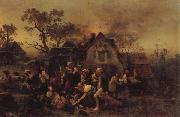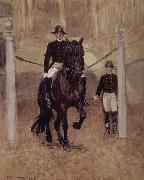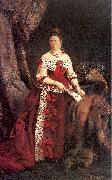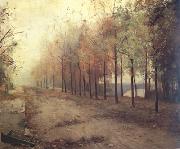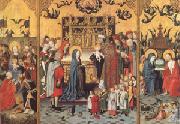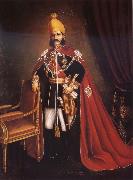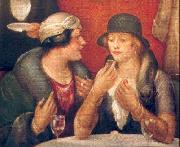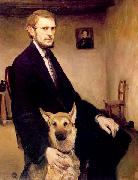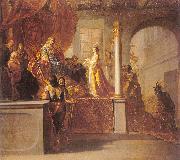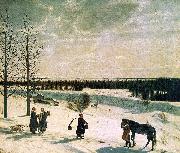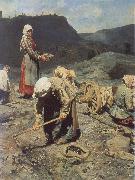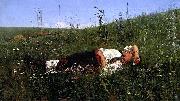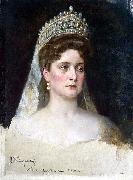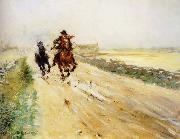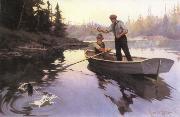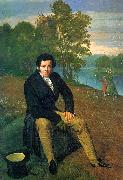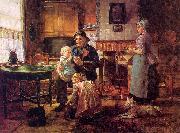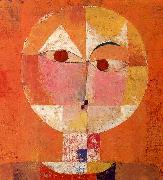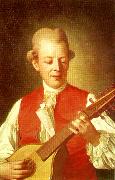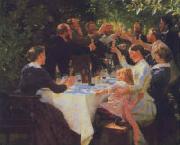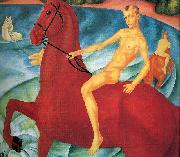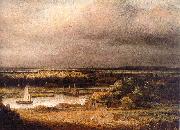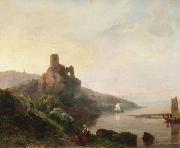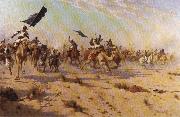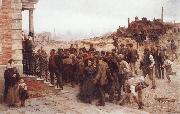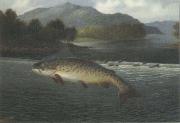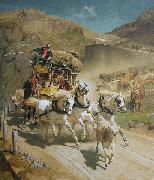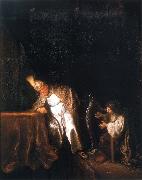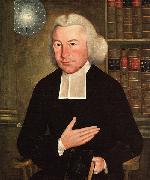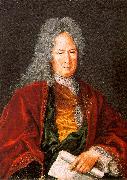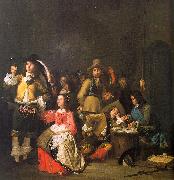|
|
|
|
|
|
|
|
|
|
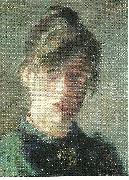 |
marie kroyer
|
|
(efter 1912 Alfven), född Triepcke 11 juni 1867 i Köpenhamn, död 25 maj 1940 i Stockholm, var en dansk konstnär, bosatt i Sverige från cirka 1905.
Marie Krøyer var 1889-1905 gift med konstnären Peder Severin Krøyer och hamnade i skuggan av hans konstnärskap. Själv kom hon att uppmärksammas som konstnär långt efter sin död. Hon levde ihop med den svenske tonsättaren Hugo Alfv??n från 1905 då de fick dottern Margita tillsammans; de gifte sig 1912 och skildes 1936 efter en lång rättsprocess. Paret var bosatta i Uppsala och Leksand. Marie hade också dottern Vibeke med Krøyer. |
|
|
|
|
|
|
|
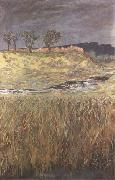 |
Max Klinger
|
|
German Symbolist Painter and Sculptor, 1857-1920 |
|
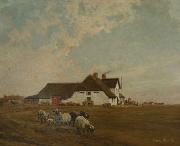 |
Max Koch
|
|
(born July 17, 1854 - April 1, 1925) was a German-born Australian botanical collector.
Born in Berlin, Koch was apprenticed to a merchant's office, but, not liking the work, joined the crew of a Glasgow-based sailing ship at Bremerhaven. He left it at Port Augusta, South Australia in April 1878, taking work at a wheat farm. Later he moved to Mount Lyndhurst sheep station, where he remained for many years. Around 1896 he began serious botanical collecting.
Koch visited Germany around 1902-1903, then returned to Australia, and in 1904 moved to the extreme south-west of Western Australia, where he spent the next 17 years working in the timber industry. By that time he had a large family, and he supplemented his income by plant specimens, and, in his later years, seed. He died at Pemberton, Western Australia in 1925
|
|
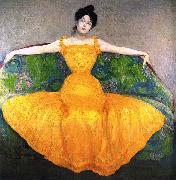 |
Max Kurzweil
|
|
Maximilian Franz Viktor Zdenko Marie Kurzweil (12 (13?) October 1867 Bisenz - 9 May 1916 Vienna) was an Austrian painter and printmaker. He moved near Vienna in 1879.
|
|
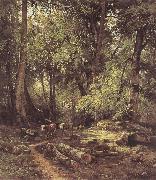 |
Mikhail Klodt
|
|
St. Petersburg,a descendant of an art dynasty1832-1902 |
|
|
|
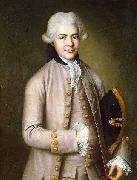 |
Mina Kolokolnikov
|
|
1708e-1775e) was a Russian painter and teacher.
Kolokolnikov was born in the village of Kravotyn in Tver gubernia. He was a serf of the Pafnutievo-Borovsky Monastery, and learnt the art of portrait painting from Ivan Nikitich Nikitin and Louis Caravaque; he also studied icon painting with Vasily Vasilevsky.
He is known to have assisted in the decoration of the palace at Tsarskoye Selo, and to have lived for a time in St. Petersburg, where one of his pupils was Trifon Anisimov. One of his portraits is in the Tver Regional Picture Gallery. He worked in the studio of Alexei Antropov; consequently, it is often difficult to tell Kolokolnikov's works from Antropov's, as both have very similar technique.
Kolokolnikov's brothers Ivan and Fedot were also painters.
|
|
|
|
|
|
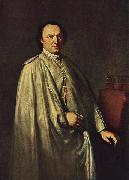 |
Moritz Kellerhoven
|
|
(1758-1830), sometimes referenced as Moritz Keller Hoven, was an Austrian painter and etcher.
Kellerhoven was born in Duchy of Berg, and spent some time studying art in Antwerp, Vienna, and Italy. He specialized in painting portraits, including many royal subjects. Kellerhoven died in Munich in 1830.
|
|
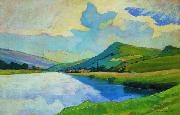 |
Nico Klopp
|
|
Den Nico Klopp war e letzebuergesche Moler. Hien ass den 18. September 1894 zu Bech-Maacher gebuer, an den 29. Dezember 1930 an der Stad Lëtzebuerg gestuerwen, wahrscheinlech un engem Gehirtumor, am Alter vun nëmme 36 Joer. Hie gëtt zu de postimpressionistesche Moler gerechent.
Säi LiewenDen Nico Klopp koum aus dem Wënzermilieu. Hien huet d'Handwierkerschoul an der Stad besicht. Seng Eltere si frei gestuerwen. No hirem Doud, huet hie sech fräi gefillt, fir vun 1915-1920 zu Dusseldorf a Weimar Konscht ze studeieren. Well hie vun der Konscht aleng net liewe konnt, war hien, vun 1923 un, Gemengereceveur zu Reimech.
Zäitweileg huet hien op Schoulen Zeechenunterrecht ginn, an huet nach en Täschegeld als Kannengerchersziichter verdengt. 1927 huet hie sech mat e puer anere Kënschtler, wei dem Joseph Kutter, dem Claus Cito, dem Auguste Tremont an anere vum Cercle Artistique getrennt, well him de Cercle ze reckstänneg war. Si goufe Sezessioniste genannt, well se 1927 e Salon de la Secession" organiseiert haten.
E puer vu senge Wierker sinn am Nationalmusee fir Geschicht a Konscht an der Stad ze gesinn.
Den Nico Klopp huet vill Biller vun der Musel gemoolt, bekannt si virun allem seng Biller vun der Muselbreck zu Reimech. Hien huet och Blummebiller gemoolt an dobäi hat hien eng Präferenz fir Tulpen. Ausserdeem war hien e Meeschter an Holz- a Linoschnëtter. |
|
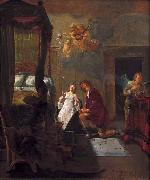 |
Nicolaes Knupfer
|
|
(1609 - 1655) was a Dutch Golden Age painter.
Knepfer was trained in Leipzig, where according to Houbraken he was apprenticed to Emanuel Nysen. He then moved to Magdeburg where he found work making brushes for artists. He stayed there until 1630, and then moved to Utrecht to work with Abraham Bloemaert. He lived with him for two years and then established his own studio in Utrecht, where in 1637 he became a visiting member of the Guild of St. Luke. He worked on the decorations of the castle Kronborg in Denemarken, and painted figures in the landscapes of Jan Both and Jan Baptist Weenix. Knepfer was a successful teacher, whose students were great painters after him, such as Jan Steen, Gabriel Metsu, Ary de Vois, and Pieter Crijnse Volmarijn.
|
|
|
|
|
|
|
|
|
|
|
|
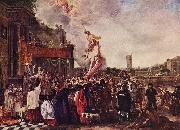 |
Nikolaus Knupfer
|
|
(1609 - 1655) was a Dutch Golden Age painter.
Knepfer was trained in Leipzig, where according to Houbraken he was apprenticed to Emanuel Nysen. He then moved to Magdeburg where he found work making brushes for artists. He stayed there until 1630, and then moved to Utrecht to work with Abraham Bloemaert. He lived with him for two years and then established his own studio in Utrecht, where in 1637 he became a visiting member of the Guild of St. Luke. He worked on the decorations of the castle Kronborg in Denemarken, and painted figures in the landscapes of Jan Both and Jan Baptist Weenix. Knepfer was a successful teacher, whose students were great painters after him, such as Jan Steen, Gabriel Metsu, Ary de Vois, and Pieter Crijnse Volmarijn. |
|
|
|
|
|
|
|
|
|
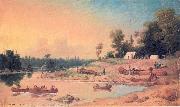 |
Paul Kane
|
|
(September 3, 1810 - February 20, 1871) was an Irish-born Canadian painter, famous for his paintings of First Nations peoples in the Canadian West and other Native Americans in the Oregon Country.
A largely self-educated artist, Kane grew up in Toronto (then known as York) and trained himself by copying European masters on a study trip through Europe. He undertook two voyages through the wild Canadian northwest in 1845 and from 1846 to 1848. The first trip took him from Toronto to Sault Ste. Marie and back. Having secured the support of the Hudson's Bay Company, he set out on a second, much longer voyage from Toronto across the Rocky Mountains to Fort Vancouver and Fort Victoria in the Columbia District, as the Canadians called the Oregon Country. |
|
|
|
|
|
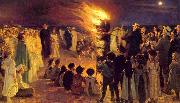 |
Peder Severin Kroyer
|
|
(23 July 1851 - 21 November 1909), known as P.S. Krøyer, was a Norwegian-Danish painter. He is one of the best known and beloved, and undeniably the most colorful of the Skagen Painters, a community of Danish and Nordic artists who lived, gathered or worked in Skagen, Denmark, especially during the final decades of the 19th century. Krøyer was the unofficial leader of the group.
|
|
|
|
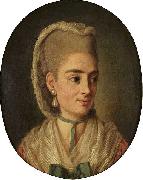 |
Per Krafft the Elder
|
|
(16 January 1724, Arboga - 7 November 1793, Stockholm) was a Swedish portraitist. He was the father of the artists Per Krafft the Younger and Wilhelmina Krafft.
|
|
|
|
|
|
|
|
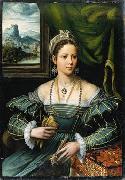 |
Pieter de Kempener
|
|
Pedro Campana (1503-1586) was a Flemish painter of the Renaissance period, mainly active in Italy and Spain. His actual name was Pieter de Kempeneer, translated into French as Champaigne, and was also known as Peter Van de Velde.
Born in Brussels, he trained there with Bernard Van Orley. His early life appears to have been spent in Italy, where he carefully studied the paintings of Raphael, and declared himself as his pupil. In 1530 he was at work at some scene-painting, representing a triumphal arch to be erected on the occasion of the coronation of Charles V, Holy Roman Emperor in Bologna, and he then left for Spain, on the advice, it is said, of Cardinal Domenico Grimani, and spent the rest of his life in that country, only returning to Brussels about 1563 or 1565.
Between 1537 and 1562 he was associated with Luis de Vargas and the Italian sculptor Torregiano in establishing a school of painting in Seville, which eventually became the academy of the place; amongst the pupils educated in it was Morales. He painted for the monastery of St. Mary of Grace, Church of Santa Cruz, in the city, an altar-piece representing the Descent from the Cross (1548), which is now in the cathedral, having been removed there when the church fell into ruins. There are other works by the same painter in Seville Cathedral, especially two representing the Purification of the Virgin and the Resurrection; and the various churches of the city, S. Isidoro, S. Pedro, S. Catalina, and S. Juan, all possess paintings by this artist. One of his last works was the restoration and repainting of a chapel belonging to Hernando de Jaen, an important resident of Seville. Murillo requested that he be buried near Campana's picture, and his burial took place in the Church of Santa Cruz, close underneath the Descent from the Cross, but the whole building was burned to the ground during the Napoleonic Wars, and the tomb perished. |
|
|
|
|
|
|
|
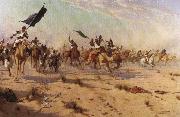 |
Robert Talbot Kelly
|
|
(1861 - 1934) was an English orientalist landscape and genre painter, author and illustrator.
Kelly was born in Birkenhead, Cheshire, the son of Irish landscape artist Robert George Kelly. He left school in 1876 to take up work in a firm of cotton traders, but was also taught art by his father, exhibiting under the name R. G. Kelly Jnr.
In the early 1880s, inspired by the places he saw while on vacation on an ocean cruise ship, Talbot-Kelly decided to take up his father's profession. He left his employment in 1882, travelled by boat to North Africa, and settled in Egypt in 1883, acquiring a studio in Cairo and becoming fluent in Arabic. He travelled throughout the country, writing about and painting the people and scenes he encountered both in towns and in the desert. He spent a considerable time with the Bedouin tribes who he described and illustrated in his 1902 book, "Egypt painted and described" (A & C Black). As his name became known he also earned an income from private commissions. He stayed in Egypt until 1915 when for reasons of health and age he returned to London - though he continued to paint constantly.
An Arab cafe in Cairo (from "Egypt painted and described", 1902)"Egypt painted and described", his first illustrated travel book, was published in 1902 (by A & C Black), and was an account of his impressions and experiences of that country during his long stay there; an exhibition of his Egyptian views was also held at the Fine Art Society in the same year. His paintings and writing showed a great empathy and respect for local people and culture, especially that of the desert Bedouin Arabs. |
|
|
|
|
|
|
|
|
|
|
|
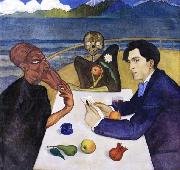 |
Shalva Kikodze
|
|
Shalva Kikodze (Georgian: შალვა ქიქოძე) (1894 - 1921) was a Georgian expressionist painter, graphic artist and theatre decorator. Together with Lado Gudiashvili and David Kakabadze, he is considered a key figure in Georgian art of the early 20th century.
He was born in a remote Georgian village Bakhvi, Guria, then part of the Russian Empire. From 1914 to 1918, he studied at Moscow School of Painting, Sculpture and Architecture. In 1916, he took part in an expedition to the Georgian village Nabakhtevi and made copies of the 15th-century murals from the local church. He stayed in his motherland for a short period of 1918-1920, and worked chiefly as a theater decorator for Jabadari Theater in Tbilisi. Afterwards he moved to Paris, where he, together with his fellow painters, Gudiashvili and Kakabadze, held an exhibition in 1921. He died in Freiburg, Germany, on November 7, 1921
|
|
|
|
|







